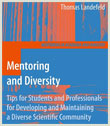As seen from THE ADVISOR March 2009
By Thomas Landefeld
The election of Barack Obama truly represents an event which many of us never believed that we would see happen in our lifetime and, maybe for some, even in our children’s lifetime! But it did and we need to embrace it in all aspects of our lives. For those of us in academia, and especially the sciences, we have new hope that the under representation of minorities will be addressed much more effectively than ever before and, concomitantly, issues such as minority health disparities will become more of a national priority (similar to the time when Dr. Satcher was Surgeon General under President Clinton). However, we cannot depend on hope alone nor can we sit back and just celebrate. The reasons why are ever so evident when we look at the differences between Blacks and whites in the country, e.g. unemployment, 9.0% vs. 4.2%; median family income, $35,464 vs. $63,156; college graduation rate, 41% vs. 61%; families owning their own homes, 48.2% vs. 75.8%; male prison inmates/100000 population, 3145 vs. 471, just to name a few. Moreover, in academia, if we look at the percentages of under represented minorities who are in graduate and professional school programs, are faculty in academic institutions and are health care professionals, the problem becomes even more evident, as these numbers come nowhere close to the percentage that minorities currently comprise of the rapidly changing demographics of this country.
So what do we do? First, for those of us that are committed to truly implementing such change, we have to be much more proactive. We can no longer sit back and let tradition take its course. For example, using standardized test scores as a major criterion for acceptance into health professional schools is unquestionably a prime example of institutional racism and therefore one of the major contributing reasons for the under representation of minorities throughout academia, an issue that has been on the table for a long time and now referenced in the recent report from the Josiah Macy Jr. Foundation on “revisiting the medical school educational mission”. And, despite the fact that most of us recognize this, we continue to go along even when we are in positions to speak up and help to make a change. Second, we have to truly promote and support “diversity” as it is defined relative to ethnic minority representation. It cannot be just a buzz word that institutions, agencies, and businesses use to make themselves feel good to avoid making real change. Nor can we allow a definition to be accepted such that “a group of white men with different color hair” represents diversity. Again, many of us are in positions to contribute significantly to these dialogues and decisions about diversity when it comes to ethnicity but often choose not to do so. In fact, as Dr. Lovell Jones, a trusted friend and colleague stated recently, too often “we go along to get along” because we are afraid of the “stress of confrontation or stress of assimilation” and either way, one loses.” This has got to change for change to truly occur.
In both of these cases as well as regarding those differences between Blacks and whites which I alluded to earlier, change can only occur when the organizations, and individuals, first truly recognize and acknowledge the role that white privilege plays, not only in those academic situations but also in those types of differences that we see in our country today, regardless of the skin color of the President. Through this acknowledgement, white privilege can then be a point of major discussion, which heretofore it has not been, and hopefully to be followed by a willingness of at least some of those with that privilege to sacrifice some those advantages so as to implement change. In other words, it will indeed take the efforts on many individuals, both minority and non-minority, to make the necessary changes, just as it did to elect Barack Obama as the first Black President! Unquestionably, this will not be easy as this is truly represents a case of “fighting the system”, but to quote Frederick Douglass “Without struggle, there is no progress.” And, if there was ever a year to see progress (and change), it is 2009!
So now is the time to go forward and speak out at your conferences, your meetings, your classes and any other place where dialogues are taking place regarding diversity. Talk about the benefits of ethnically diverse participation, involvement and decision-making in not only academia but also in society and why we can never, as a nation, reach our full potential unless we are inclusive of all groups. And, as important of a step that it was to elect a Black President, he, plus those around him, need lots of help in making the type of change that is necessary. In fact, it calls for exactly the type of help that it took to get him elected, i.e. you stood up, you rallied, you volunteered and you voted. That same type of commitment and support is needed to make the types of necessary changes to an academic system that is operating, in many ways, like it is still the 60’s. And, it will take the same type of effort and commitment that we saw in the South in the 60’s to bring about the change. Are you ready? Quite frankly, if you are not ready after witnessing the events that have occurred in this country since November 4th, culminating with those around the inauguration, then this change in our field of interest, is not going to happen. As indicated in the recent report from the Josiah Macy Jr. Foundation, the time is definitely prime for “revisiting the medical school educational mission”, with increasing the representation of under served populations being a major component of that change. As Pre-health advisors, we have to be major players in this effort in addressing this critically important problem in our medical community and in society in general.
Author Alice Walker once appropriately stated: “Ignorance, arrogance and racism have bloomed as Superior knowledge in all too many universities.” Let’s change that – NOW.

